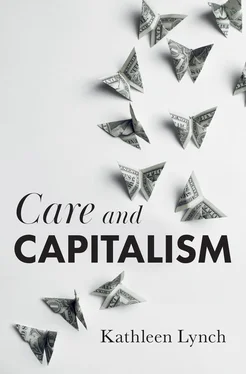6 6 The reasons for the rise of new-right politics are complex, varying from country to country, and across time. For a review of research on these movements see Mudde (2007, 2014); Golder (2016); Muis and Immerzeel (2017).
7 7 The EU is a prime example of a political and legal institution that has implemented deep forms of neoliberalization. Since the late 1970s, ongoing welfare-state retrenchment and a decline in redistributive solidarity are a salient European development (Korpi 2003). Social protections are increasingly marketized and outsourced, with an attendant lack of protection for those who are most vulnerable in a pay-as-you-go welfare system (Frericks 2011). What has emerged is a new ‘post-industrial welfare support coalition’ predominantly rooted within the professional and managerial middle classes (Gingrich and Häusermann 2015; Mau 2015). State supports have shifted from compensating people for income loss and vulnerability towards labour activation policies and human capital investment programmes. Welfare supports are increasingly commodified and social protections are tied to market processes. The individualization of responsibility for one’s own welfare is central to this process (Lynch and Kalaitzake 2018).
8 8 There are now moves at EU and OECD level to introduce some type of global taxation. The finance ministers from the world’s seven leading economies (the G7), at their meeting in Cornwall on 5 June 2021, agreed on the principle of introducing a global minimum effective tax rate of at least 15 per cent in each country in which a business operates. How this will be translated into practice is as yet unclear, but it is a hopeful sign in terms of global tax reform. https://www2.deloitte.com/nl/nl/pages/tax/articles/g7-finance-ministers-agree-on-taxation-of-digitalized-economy-global-minimum-rate.html.
9 9 It has been through such protest movements that progressive and ‘left’ politics have found expression (De Chiro 2008; Casalini 2017), while the ‘right’ has organized more through political parties (Hutter 2014).
10 10 For a full discussion of the similarities and differences between love, care and solidarity see Lynch (2007) and Lynch, Baker and Lyons (2009).
Part I Care Matters Inside and Outside Capitalism
2 Care as Abject: Capitalism, Masculinity, Bureaucracy, Class and Race
Capitalism does not survive solely on exploitative class relations. The production and reproduction of classes require care labour, both the care of people and of those parts of nature that are available for exploitation and commodity production (Dalla Costa and James 1972; Federici 2012; Patel and Moore 2018). Humans, non-human animals and the Earth itself require attentiveness to survive and flourish, and capitalism requires caring to happen, even it does not pay for it directly and exploits it indirectly.
While care is central to capitalism’s survival materially, the devaluation of care is also endemic to capitalism. There is a value disassociation within it through which the labour of caring and reproducing humanity itself is ‘dissociated from value and abstract labor’ (Scholz 2009: 127). The severance of production from reproduction and caring in modernity has created a deep dichotomy of values. ‘The commodity-producing civilizational model’ that is glorified under contemporary capitalism is underpinned by a system of care and domestic relations built around the marginalization of those who do the care work, mostly women, and the neglect of the natural and the social world (Scholz 2009: 130). 1Unpaid reproductive work, and unpaid love and care work, are not value-producing in capitalist terms. They have vital use values but not an exchange value. 2Affective care relations exist as a different order of values, values that are jettisoned within the ethics of capitalism.
The globalization of capitalism in the neoliberal financialized era has exacerbated this trend. The instrumental exploitative logic of homo economicus (Brown 2005) contradicts the logic of being homo curans ; it undermines cooperative, nurturing, non-exploitative ways of relating to other humans and the natural world (Tronto 2017). In economic terms, care is defined as a private value for which capital is not responsible. And capitalism especially devalues relational embodied care, by treating it as both a cultural and an economic externality (Müller 2019). To pay for care directly would reduce profit (hence the persistent resistance to paying for public childcare in most countries, and, increasingly, resistance to paying for eldercare). In cultural terms, caring is associated with dependency, the vulnerable other who threatens productivity (profit) by either needing care or being tied to caring. Those in need of embodied care are treated as abject, as is the hands-on work of bodily caring, especially in societies that see both death and bodily fragility as problems to be eradicated (Banerjee and Rewegan, 2017).
At a wider cultural level, capitalism produces moral dispositions of indifference to the interests of others, what Adorno (2005) termed ‘ bourgeois coldness ’ in the pursuit of one’s own interests. This coldness is not the preserve of any one class or group, though the power to exercise coldness is most available to those with the capacities to exclude, and with most to gain from exercising indifference towards the vulnerable other. In the twenty-first century, the upper classes, especially the oligarchic elite, reflect these capitalist values as they live without allegiance to any nation state or people. In many respects, ‘their fate and that of their families have become independent from the fates of the societies from which they extract their wealth’ (Streeck 2016: 28). They can ‘buy’ political majorities through advertising and campaign contributions at election times, while gaining social legitimacy through philanthropy. They provide charity for their chosen ‘causes’, frequently funding public institutions, such as higher education and hospitals, impoverished by the elite’s failure to pay taxation commensurate with their personal and corporate wealth (Winters 2011; Browne 2013). And although a small number of women are among the oligarchic elite and the upper-middle-class professionals who service them, and thereby benefit from their class dividend, they are rarely the leaders or those who exercise controlling power over capital.
Patriarchy and Capitalism Interface
Capitalism is not simply a form of hierarchical organization; it is a hierarchy in which people from particular backgrounds fill particular positions. Gender and racial hierarchies feed into the class hierarchies, playing a major role in determining who fills the empty class places. The capitalist economy works in and through a gendered and raced division of labour, including care labour and domestic labour, building on and exploiting pre-existing divisions of race, gender and status (Duffy 2005, 2011; Glenn 2010; Gutiérrez-Rodríguez 2014; Romero and Perez 2016; Folbre 2020). In so doing, it is not only a classed accumulation process but also a gendered and raced accumulation process.
While there is an internal, classed care economy within most wealthy countries, much of care labour supplied to the rich North/West of the world involves mining the care ‘gold’ (Hochschild 2002) of other countries, especially that of poorer countries. Care has become an export, not unlike other raw materials, 3often extracted from former colonies, especially from women (Hochschild 2003; Mahadaven 2020), a twenty-first-century ‘mining’ of poorer parts of the world to supply the needs of the rich. In the United States, women from Mexico, Central America and the Caribbean account for much of the growth in domestic workers, cleaners, personal care workers and childcare workers since 2000 (Duffy 2020), while nurses from the Philippines, 4and to a lesser degree India (Brush and Vasupuram 2006; Garner, Conroy and Bader 2015; WHO 2018), fill many nursing positions in the UK. Although men comprise the majority of migrants globally, 5women comprise the majority of migrants to Northern, Southern and Western Europe and half of those to the US (IOM 2020), a very large proportion of whom are working in care services, including in the highly unregulated home care and domestic sectors (Misra 2003; Da Roit, González Ferrer and Moreno-Fuentes 2013). These globalized care workers do benefit from their employment, as do their families in the sending countries through emigrant remittances. However, their involuntary migrations often leave care deficits behind in their country of origin (Anderson 2000; Hochschild 2002). 6When women with young children migrate without their families, it is other women who are left behind who take on informal family caring, while the women who migrate suffer the loss of intimacy of their own families (Anderson 2000).
Читать дальше












